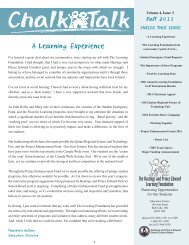Grade 11 Healthy Active Living Education Additional Supports ...
Grade 11 Healthy Active Living Education Additional Supports ...
Grade 11 Healthy Active Living Education Additional Supports ...
Create successful ePaper yourself
Turn your PDF publications into a flip-book with our unique Google optimized e-Paper software.
• sexually transmitted infections (e.g., chlamydia, gonorrhea) and pelvic conditions if<br />
left untreated can cause conditions in both males and females which can impair<br />
fertility<br />
Note:<br />
− genital chlamydia infection is the leading cause of preventable infertility and<br />
ectopic pregnancy<br />
− 80% of women and 25% of men with chlamydia have no symptoms<br />
− 50% of women and 25% of men with gonnorhea have no symptoms<br />
− Pelvic Inflammatory Disease (PID) can cause tubal damage in women and<br />
increase risk of ectopic pregnancy<br />
− inflammatory effects of infection in male reproductive organs (e.g., epididymitis)<br />
can cause scarring<br />
− Human Papilloma Virus (HPV) is often a precursor to cervical dysplasia<br />
− cervical treatments may reduce fertility by causing scarring or damage to cervical<br />
mucous-producing cells<br />
• lifestyle choices that affect nutrition, physical activity and healthy sexual practices<br />
effect overall health and fertility status<br />
• infectious diseases such as mumps after puberty can cause sterility<br />
• rubella can cause birth defects (up to date immunization is important in childbearing<br />
years of both males and females)<br />
• issues relating to same sex couples wishing to parent<br />
Hormone/Genetic Factors<br />
• can affect sperm quality, production and ovulation (e.g., failure to ovulate regularly,<br />
or irregular menstrual cycle, may be caused by problems with the hypothalamus and<br />
pituitary gland)<br />
• congenital factors may impede ability to conceive (e.g., born without uterus)<br />
Stress<br />
• psychological stress (e.g., depression, difficulty sleeping, anxiety) and physiological<br />
stress (increased muscle tension, lack of energy, nervousness) affect libido<br />
• stress affects the ability to make healthy lifestyle choices (e.g., alcohol and other<br />
substance use, smoking, decrease in physical activity or sedentary living, poor<br />
nutrition) which in turn also affects fertility<br />
General Health<br />
• endometriosis can cause scarring, tubal blockage and possible immune responses<br />
(Note: 25-30% of infertile women have endometriosis)<br />
• there is conflicting evidence that tight clothing may affect sperm production<br />
• Sickle Cell disease can cause possible impotence due to nerve and tissue damage and<br />
may increase the incidence of miscarriage in women<br />
E. Fertility Awareness Methods<br />
Background Information<br />
• an egg can live for up to 24 hours in the uterus following ovulation<br />
• sperm usually live for up to 5 days in the uterus following intercourse<br />
• ovulation happens 13 to15 days before the first day of the next menstrual period<br />
<strong>Grade</strong> <strong>11</strong> <strong>Healthy</strong> <strong>Active</strong> <strong>Living</strong> <strong>Education</strong> (PPL30), Module #1 <strong>Healthy</strong> Relationships and Sexuality<br />
Page 17
















